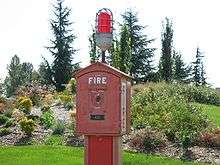Alarm device
An alarm device or system of alarm devices gives an audible, visual or other form of alarm signal about a problem or condition. Alarm devices are often outfitted with a siren.

Alarm devices include:
- burglar alarms, designed to warn of burglaries; this is often a silent alarm: the police or guards are warned without indication to the burglar, which increases the chances of catching him or her.
- alarm clocks can beep, buzz or ring off as an alarm at a set time to wake a person up or for other reminders
- distributed control systems (DCS), found in nuclear power plants, refineries and chemical facilities also generate alarms to direct the operator's attention to an important event that he or she needs to address.
- alarms in an operation and maintenance (O&M) monitoring system, which informs the bad working state of (a particular part of) the system under monitoring.
- safety alarms, which go off if a dangerous condition occurs. Common public safety alarms include:
- civil defense siren also known as tornado sirens or air raid sirens
- fire alarm systems
- fire alarm notification appliance
- "Multiple-alarm fire", a locally specific measure of the severity of a fire and the fire-department reaction required.
- smoke detector
- car alarms
- autodialer alarm, also known as community alarm
- personal alarm
- Video Alarm Verification System provides instant notifications upon the detection of a possible threat verified through a video feed.
- tocsin – a historical alarm mechanism
Alarms have the capability of causing a fight-or-flight response in humans; a person under this mindset will panic and either flee the perceived danger or attempt to eliminate it, often ignoring rational thought in either case. A person in such a state can be characterised as "alarmed".
With any kind of alarm, the need exists to balance between on the one hand the danger of false alarms (called "false positives") — the signal going off in the absence of a problem — and on the other hand failing to signal an actual problem (called a "false negative"). False alarms can waste resources expensively and can even be dangerous. For example, false alarms of a fire can waste firefighter manpower, making them unavailable for a real fire, and risk injury to firefighters and others as the fire engines race to the alleged fire's location. In addition, false alarms may acclimatise people to ignore alarm signals, and thus possibly to ignore an actual emergency: Aesop's fable of The Boy Who Cried Wolf exemplifies this problem.
Etymology
The word came from the Old French A l'arme meaning "To the arms", "To the weapons", telling armed men to pick up their weapons and get ready for action, because an enemy may have suddenly appeared.[1]